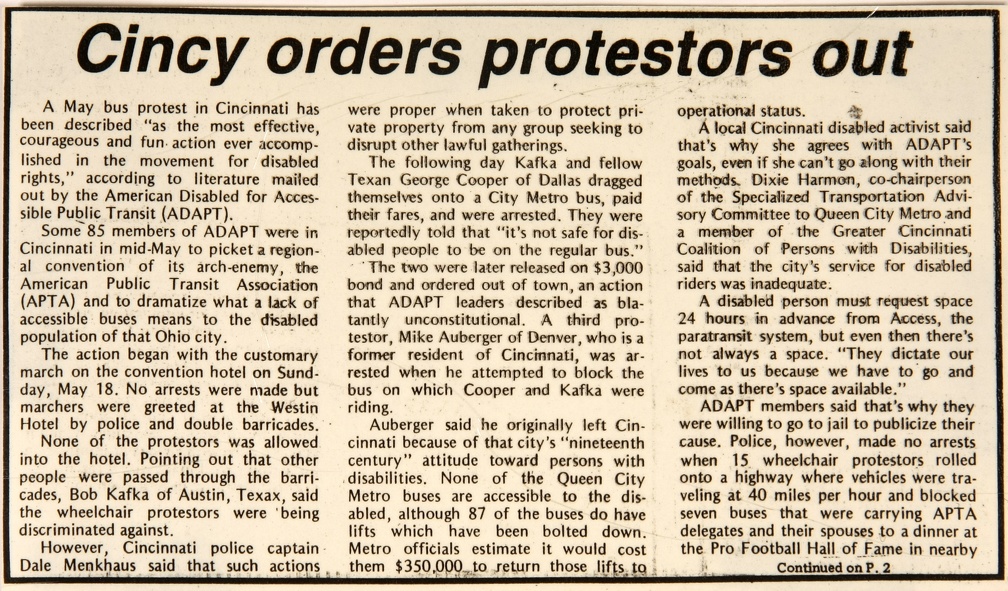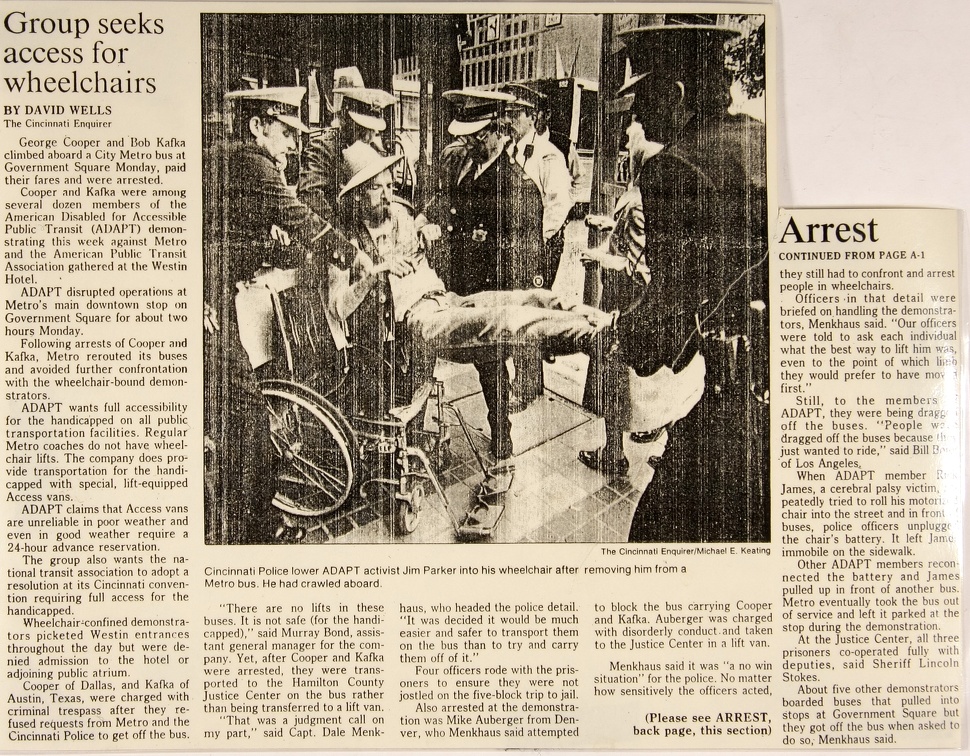- ภาษาAfrikaans Argentina AzÉrbaycanca
á¥áá áá£áá Äesky Ãslenska
áá¶áá¶ááááá à¤à¥à¤à¤à¤£à¥ বাà¦à¦²à¦¾
தமிழ௠à²à²¨à³à²¨à²¡ ภาษาà¹à¸à¸¢
ä¸æ (ç¹é«) ä¸æ (é¦æ¸¯) Bahasa Indonesia
Brasil Brezhoneg CatalÃ
ç®ä½ä¸æ Dansk Deutsch
Dhivehi English English
English Español Esperanto
Estonian Finnish Français
Français Gaeilge Galego
Hrvatski Italiano Îλληνικά
íêµì´ LatvieÅ¡u Lëtzebuergesch
Lietuviu Magyar Malay
Nederlands Norwegian nynorsk Norwegian
Polski Português RomânÄ
Slovenšcina Slovensky Srpski
Svenska Türkçe Tiếng Viá»t
Ù¾Ø§Ø±Ø³Û æ¥æ¬èª ÐÑлгаÑÑки
ÐакедонÑки Ðонгол Ð ÑÑÑкий
СÑпÑки УкÑаÑнÑÑка ×¢×ר×ת
اÙعربÙØ© اÙعربÙØ©
หน้าหลัก / อัลบั้ม / แท็ค Bob Kafka + jail
+ jail + inaccessible buses
+ inaccessible buses 2
2

 ADAPT (250)
ADAPT (250)
Cincy orders protesters out A May bus protest in Cincinnati has been described “as the most effective, courageous and fun action ever accomplished in the movement for disabled rights," according to literature mailed out by the American Disabled for Accessible Public Transit (ADAPT). Some 85 members of ADAPT were in Cincinnati in mid-May to picket a regional convention of its arch-enemy, the American Public Transit Association (APTA) and to dramatize what a lack of accessible buses means to the disabled population of that Ohio city. The action began with the customary march on the convention hotel on Sunday, May 18. No arrests were made but marchers were greeted at the Westin Hotel by police and double barricades. None of the protestors was allowed into the hotel. Pointing out that other people were passed through the barricades, Bob Kafka of Austin, Texas, said the wheelchair protestors were being discriminated against. However, Cincinnati police captain Dale Menkhaus said that such actions, were proper when taken to protect private property from any group seeking to disrupt other lawful gatherings. The following day Kafka and fellow Texan George Cooper of Dallas dragged themselves onto a City Metro bus, paid their fares, and were arrested. They were reportedly told that “it’s not safe for disabled people to be on the regular bus.” The two were later released on $3,000 bond and ordered out of town, an action that ADAPT leaders described as blatantly unconstitutional. A third protestor, Mike Auberger of Denver, who is a former resident of Cincinnati, was arrested when he attempted to block the bus on which Cooper and Kafka were riding. Auberger said he originally left Cincinnati because of that city's “nineteenth century” attitude toward persons with disabilities. None of the Queen City Metro buses are accessible to the disabled, although 87 of the buses do have lifts which have been bolted down. Metro officials estimate it would cost them $350,000 to return those lifts to operational status. A local Cincinnati disabled activist said that's why she agrees with ADAPT’s goals, even if she can't go along with their methods. Dixie Harmon, co-chairperson of the Specialized Transportation Advisory Committee to Queen City Metro and a member of the Greater Cincinnati Coalition of Persons with Disabilities, said that the city’s service for disabled riders was inadequate. A disabled person must request space 24 hours in advance from Access, the paratransit system, but even then there's not always a space. “They dictate our lives to us because we have to go and come as there's space available.” ADAPT members said that's why they were willing to go to jail to publicize their cause. Police, however, made no arrests when 15 wheelchair protestors rolled onto a highway where vehicles were traveling at 40 miles per hour and blocked seven buses that were carrying APTA delegates and their spouses to a dinner at the Pro Football Hall of Fame in nearby Canton. Police were caught by surprise, as they had barricades to turn back protestors at the entrance to the Hall of Fame. Two local disabled leaders who were accompanying the APTA delegation to the dinner were taunted as “Uncle Toms” in front of TV cameras. Early the next day ADAPT members were back in front of the Weston Hotel where they erected a huge cross and hung a wheelchair from it in a mock crucifixion. On the final day of the convention, 17 protestors were arrested when they blocked the hotel driveway and refused police orders to move. Many of those arrested were ordered to jail unless they agreed to leave town. Three protestors, Auberger, Cooper and Kafka, decided the time had come for disabled protestors to do “hard time” and ended up serving 10 days. Five other protestors were turned out of jail because they had special medical problems or speech impairments. Others were released after pleading “no contest” to the charges in hastily organized trials. “Even the story we had left town and the protest was over made TV news," an ADAPT spokesperson said. ADAPT (240)
ADAPT (240)
The Cincinnati Enquirer Photo by the Cincinnati Enquirer/Michael E. Keating: Four police officers holding a thin, tall man (Jim Parker)by his legs and arms suspending him in the air while they try to place him in the wheelchair. Another police officer and a passerby at the street corner are visible in background, as well as a city bus parked with its doors open. Caption: Cincinnati Police lower ADAPT activist Jim Parker into his wheelchair after removing him from a Metro bus. He had crawled aboard. [Headline] Group seeks access for wheelchairs By David Wells George Cooper and Bob Kafka climbed aboard a City Metro bus at Government Square Monday, paid their fares and were arrested. Cooper and Kafka were among several dozen members of the American Disabled for Accessible Public Transit (ADAPT) demonstrating this week against Metro and the American Public Transit Association gathered at the Westin Hotel. ADAPT disrupted operations at Metro’s main downtown stop on Government Square for about two hours Monday. Following arrests of Cooper and Kafka, Metro rerouted its buses and avoided further confrontation with the wheelchair-bound demonstrators. ADAPT wants full accessibility for the handicapped on all public transportation facilities. Regular Metro coaches do not have wheelchair lifts. The company does provide transportation for the handicapped with special, lift-equipped Access vans. ADAPT claims that Access vans are unreliable in poor weather and even in good weather require a 24-hour advance reservation. The group also wants the national transit association to adopt a resolution at its Cincinnati convention requiring full access for the handicapped. Wheelchair-confined demonstrators picketed Westin entrances throughout the day but were denied admission to the hotel or adjoining public atrium. Cooper of Dallas, and Kafka of Austin, Texas, were charged with criminal trespass after they refused requests from Metro and the Cincinnati Police to get off the bus. “There are no lifts in these buses. It is not safe (for the handicapped), “said Murray Bond, assistant general manager for the company. Yet, after Cooper and Kafka were arrested, they were transported to the Hamilton County Justice Center on the bus rather than being transferred to a lift van. “That was a judgement call on my part,” said Capt. Dale Menkhaus, who headed the police detail. “It was decided it would be much easier and safer to transport them on the bus than to try to carry them off of it.” Four officers rode with the prisoners to ensure they were not jostled on the five-block trip to jail. Also arrested at the demonstration was Mike Auberger from Denver, who Menkhaus said attempted to block the bus carrying Cooper and Kafka. Auberger was charged with disorderly conduct and taken to the Justice Center in a lift van. Menkhaus said it was “a no win situation” for the police. No matter how sensitively the officers acted, they still had to confront and arrest people in wheelchairs. Officers in that detail were briefed on handling the demonstrators. Menkhaus said. “Our officers were told to ask each individual what the best way to lift him was, even to the point of which limb they would prefer to have moved first.” Still, to the members ADAPT, they were being dragged off the buses. “People were being dragged off the buses because they just wanted to ride,” said Bill Bolte of Los Angeles. When ADAPT member Rick James, a cerebral palsy victim repeatedly tried to roll his motorized chair into the street and in front of buses, police officers unplugged the chair’s battery. It left James immobile on the sidewalk. Other ADAPT members reconnected the battery and James pulled up in front of another bus. Metro eventually took the bus out of service and left it parked at the stop during the demonstration. At the Justice Center, all three prisoners co-operated fully with deputies, said Sheriff Lincoln Stokes. About five other demonstrators boarded buses that pulled in the stops at Government Square but they got off the bus when asked to do so, Menkhaus said.